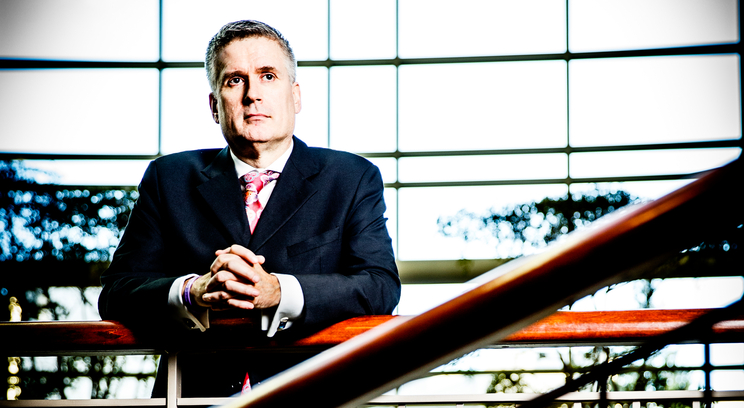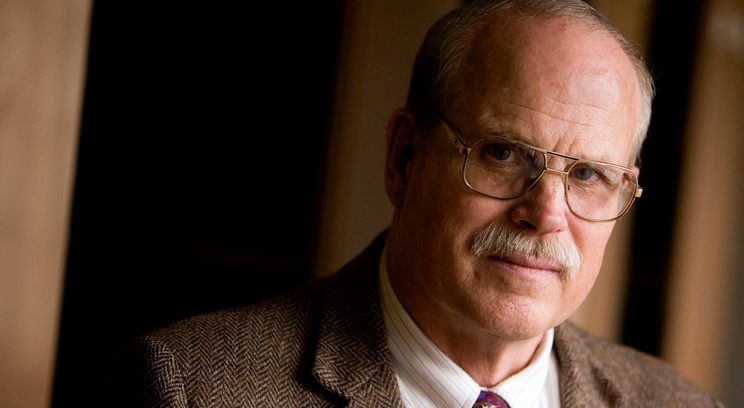Life sometimes presents opportunities that can be turning points for those with the eyes to see them. Tim Flynn ’11 is one who has recognized those key moments and used them to build a career of upholding human rights.
Growing Up in South Dakota
Flynn grew up in Huron, S.D., a town of about 7,000 people. “I thought we were hot stuff – until I went to my first Twins game and realized the whole town could fit into a couple of sections,” he said.
At a time when his peers were interested in sports, Flynn was deeply involved in politics. He grabbed the chance to take two months off from high school to work on Jimmy Carter’s presidential campaign. Also while in high school, Flynn was elected president of the Young Democrats in South Dakota. Since this group defined “young” as anyone under age 35, serving as president while in high school was exceedingly rare.
When His World Changed
Flynn was studying prelaw at what was known then as St. Mary’s College in Winona, Minn., when his world changed. His older sister was diagnosed with breast cancer. She was a single mom with two young daughters and no health insurance. Flynn stepped up, becoming a surrogate dad to his nieces. “That’s been the biggest blessing in my life,” he said.
Someone in the family needed to make money, so Flynn switched gears and went into business. He worked in food packaging for Alcoa. He loved his business career, but after 25 years, he wanted to use his skills to make the world a better place. Initially, he looked at educational programs that train business people to lead nonprofits.
Serving on jury duty in December 2007 inspired him to take another direction – to finish his law degree.
“This case involved a kid whose only crime was ‘driving while black,’” Flynn said. “It took us longer to select a jury foreman than to find this young man not guilty. Most of us were just frustrated that the case had ever gone to trial.”
He took the LSAT six weeks later, and enrolled at the School of Law the following fall.
Opportunities at UST Law
Flynn chose the School of Law because of its public service focus, and specifically because of the Community Justice Project, a clinic housed in the Interprofessional Center for Counseling and Legal Services, or IPC.
“Being a part of the Community Justice Project and the IPC was incredible,” he said. “It gave me two solid years of civil rights experience, and fit perfectly into my plan for law school, which was to take advantage of every hands-on learning opportunity I could find.”
“And the relationships I built have been invaluable,” he said. Professors Nekima Levy Pounds and Artika Tyner have been mentors, teachers, colleagues, friends and compatriots from day one.”
Flynn’s fellow CJP students also helped him connect with diversity groups within the School of Law, and more opportunity. As a 1L, he attended the Black Law Student Association Night of Distinction, at which Judge Michael Davis spoke. “Judge Davis told us that surprisingly few people apply for judicial externships, and encouraged us to apply,” Flynn said. “After the event, I ran into the judge on the way to the parking ramp, and told him I intended to apply. I applied and was selected.”
Another opportunity he seized was in the Foundations of Justice course, when he and his partner decided to write on the 50th anniversary of the Gideon decision. Flynn reached out to the Dorsey and Whitney office of Walter Mondale, who wrote an amicus brief in the case. As a result, Flynn, his partner and a few other 1Ls interviewed Mondale about the case.
This experience is typical of the Twin Cities legal community, Flynn has found. “Many people will bend over backward to help you, to share wisdom. You just need to ask,” he said. This is not the case in other cities in which Flynn has lived, and it’s one of the reasons he wanted to live, study and work in the Twin Cities.
Human Rights Career
After Flynn graduated in 2011, he became deputy director of human rights and equal economic opportunity for the city of St. Paul. Then last August, he joined the Minnesota Department of Human Rights as assistant commissioner.
Even that job has UST law connections. Through an on-campus interview, Flynn was hired to work at the Ramsey County Attorney’s Office the summer after his 2L year. Two years later, Gov. Mark Dayton picked Kevin Lindsey, one of Flynn’s colleagues at the Ramsey County Attorney’s Office, to run the state’s Department of Human Rights, and Lindsey tapped Flynn to be his assistant commissioner.
At the Department of Human Rights, Flynn oversees two groups. One investigates discrimination complaints, based primarily on race, ethnicity, gender, sexual orientation or disability. If a case is found to have merit and a negotiated settlement agreement is not reached, then the case is turned over
to the Attorney General’s office for litigation.
The other group oversees contract compliance requirements. To make up for past discrimination, women and minority-owned businesses must have a chance to bid on any state contract over $100,000. They also monitor efforts by prime state contractors to create opportunities for more women and minorities to gain the skills needed to work in the building trades.
It’s all about making sure people have the opportunity to reach their dreams – just like Flynn has.
Read more from St. Thomas Lawyer.





